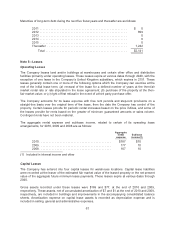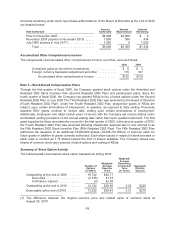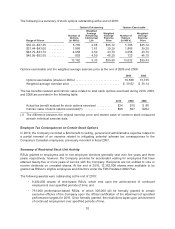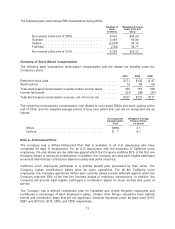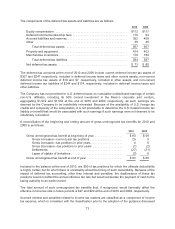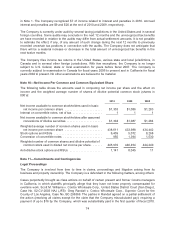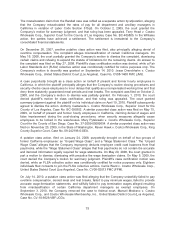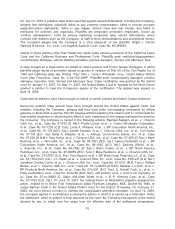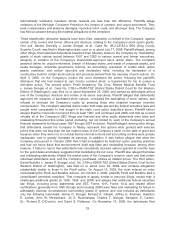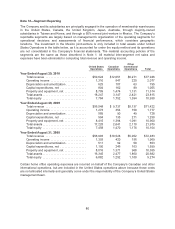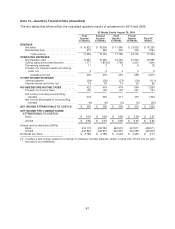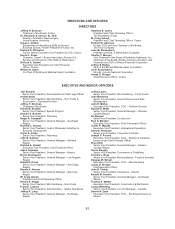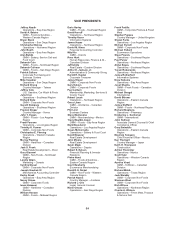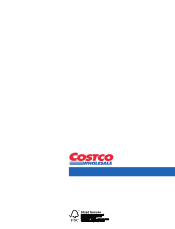Costco 2010 Annual Report Download - page 79
Download and view the complete annual report
Please find page 79 of the 2010 Costco annual report below. You can navigate through the pages in the report by either clicking on the pages listed below, or by using the keyword search tool below to find specific information within the annual report.correcting dispensers in the States of Alabama, Arizona, California, Florida, Georgia, Kentucky,
Nevada, New Mexico, North Carolina, South Carolina, Tennessee, Texas, Utah, and Virginia. Other
than payments to class representatives, the settlement does not provide for cash payments to class
members. On August 18, 2009, the court preliminarily approved the settlement. On August 13, 2010,
the court denied plaintiffs’ motion for final approval of the settlement. The Company expects that a
revised settlement will be submitted for court approval.
The Company has been named as a defendant in two purported class actions relating to sales of
organic milk. Hesse v. Costco Wholesale Corp., No. C07-1975 (W.D. Wash.); Snell v. Aurora Dairy
Corp., et al., No. 07-CV-2449 (D. Col.). Both actions claim violations of the laws of various states,
essentially alleging that milk provided to Costco by its supplier Aurora Dairy Corp. was improperly
labeled “organic.” Plaintiffs filed a consolidated complaint on July 18, 2008. With respect to the
Company, plaintiffs seek to certify four classes of people who purchased Costco organic milk. Aurora
has maintained that it has held and continues to hold valid organic certifications. The consolidated
complaint seeks, among other things, actual, compensatory, statutory, punitive and/or exemplary
damages in unspecified amounts, as well as costs and attorneys’ fees. On June 3, 2009, the district
court entered an order dismissing with prejudice, among others, all claims against the Company. As a
result of an appeal by the plaintiffs, on September 15, 2010, the court of appeals affirmed in part and
reversed in part the rulings of the district court and remanded the matter for further proceedings.
The Company has been named as a defendant in a purported class action relating to sales of farm-
raised salmon. Farm Raised Salmon Coordinated Proceedings, Los Angeles Superior Court Case No.
JCCP No. 4329. The action alleges that the Company violated California law requiring farm-raised
salmon to be labeled as “color added.” The complaint asserts violations of the California Unfair
Competition Law, the California Consumer Legal Remedies Act, and the California False Advertising
Law, and negligent misrepresentation, and seeks restoration of money acquired by means of unfair
competition or false advertising and compensatory damages in unspecified amounts, injunctive relief
remedying the allegedly improper disclosures, and costs and attorneys’ fees. A California Superior
Court ruling dismissing the action on the ground that federal law does not permit claims for mislabeling
of farm-raised salmon to be asserted by private parties was reversed by the California Supreme Court.
The Company has denied the material allegations of the complaint. Plaintiffs’ motion to certify a class
is pending.
In Verzani, et ano., v. Costco Wholesale Corp., No. 09 CV 2117 (United States District Court for the
Southern District of New York), a purported nationwide class action, the plaintiffs allege claims for
breach of contract and violation of the Washington Consumer Protection Act, based on the failure of
the Company to disclose on the label of its “Shrimp Tray with Cocktail Sauce” the weight of the shrimp
in the item as distinct from the accompanying cocktail sauce, lettuce, and lemon wedges. The
complaint seeks various forms of damages (including compensatory and treble damages and
disgorgement and restitution), injunctive and declaratory relief, attorneys’ fees, costs, and prejudgment
interest. On April 21, 2009, the plaintiff filed a motion for a preliminary injunction, seeking to prevent the
Company from selling the shrimp tray unless the Company separately discloses the weight of the
shrimp and provides shrimp consistent with the disclosed weight. By orders dated July 29 and
August 6, 2009, the court denied the preliminary injunction motion and dismissed the claim for breach
of contract, and on July 21, 2010, the court of appeals summarily affirmed these rulings. On
September 28, 2010, the district court denied the motion of one plaintiff to file an amended complaint.
In Kilano, et. ano, v. Costco Wholesale Corp., No. 2:10-cv-11456-VAR-DAS (United States District
Court for the Eastern District of Michigan), two members purport to represent a class of certain
Michigan Executive level-members who received 2% rewards. Plaintiffs allege that the Company
“guarantees” that the member will receive rewards of no less than the fifty dollar difference between
Executive and Gold Star membership and that the Company is required to but has failed to
77


